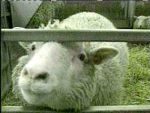|
Around the world geneticists are now continuing one of the
biggest scientific projects of all time. Known as the Human Genome Project (HGP),
the aim is to decipher the entire genetic code of human beings, and to try to
understand the functioning of the 40,000 or so genes that make up the DNA that
lies at the heart of every cell in our bodies. This project has been called the
biological equivalent of putting a man on the moon. Thousands of researchers in
many countries are engaged in this project, and the US government alone has
committed three billion dollars to the effort over a fifteen year period. HGP
research in the US is coordinated at the National Human Genome Research
Institute, located at the National Institutes of Health in Bethesda, Maryland.
 Knowledge
gained by HGP researchers and by other gene scientists is giving us an
unprecedented ability to manipulate genes - what is known as genetic
engineering. While this technology may lead to new cures for inherited diseases,
and even (it is hoped) for many kinds of cancers, some religious believers have
been resistant to genetic engineering. Some have even expressed the view that
DNA is sacred and that scientists are hubristically attempting to "play
god" when they tamper with DNA. Knowledge
gained by HGP researchers and by other gene scientists is giving us an
unprecedented ability to manipulate genes - what is known as genetic
engineering. While this technology may lead to new cures for inherited diseases,
and even (it is hoped) for many kinds of cancers, some religious believers have
been resistant to genetic engineering. Some have even expressed the view that
DNA is sacred and that scientists are hubristically attempting to "play
god" when they tamper with DNA.
But if this view has received considerable media attention,
there are also Christians who see genetic engineering as in keeping with their
Christian mission. One of this latter group is Dr. Francis Collins, a leading
gene researcher and the director of the National Human Genome Research
Institute. Dr. Collins, who was head of the team that discovered the genes for
cystic fibrosis and Huntington's disease, is a devout Christian, having become
converted to that faith at the age of 27. Rather than seeing genetic engineering
as contrary to his faith, Dr. Collins considers it as an extension of the
Christian mandate to help heal the sick.
Likewise Lutheran theologian Ted Peters, an expert on the
theological implications of gene science, sees no intrinsic problem here from a
Christian perspective. In particular, Peters regards the idea of DNA being
sacred as muddle headed. Why single out DNA, he asks? It is just another
molecule in our bodies, a very complex and important molecule to be sure, but
ultimately just another part of our physical makeup. In that sense it is no more
sacred than say our blood, which is routinely manipulated by doctors.
Consequently, Peters rejects the view that genetic engineering is "playing
God". Like Collins, he sees it as a powerful way to alleviate sickness and
suffering, and therefore something which, used wisely, should have theological
sanction.
 Yet
there is no doubt that some advances in gene science do worry many religious
believers - and also many non-believers. One recent development that has caused
concern is cloning. The first announcement of a cloned mammal came in 1997, when
the Roslin Institute in Scotland made headlines around the world with their
cloned sheep named Dolly. Since then, other researchers have cloned cows and
mice. When news of Dolly hit the press many people feared cloning would open the
door to all sorts of evils. Could a dictator clone a private army? Or perhaps
himself? Would a clone be treated as fully human? Would cloning lower the value
of human life? After the announcement of Dolly, President Clinton called for a
ban on all scientific and medical research into human cloning, and in February
1998 Senator William Frist introduced into the US Senate a bill that would make
human cloning illegal. Even some scientists are concerned about human cloning,
including Dr. Collins. While supporting research into animal cloning for
agricultural purposes, he believes that "this way of creating a human
being" is "not part of God's plan for our lives." Yet
there is no doubt that some advances in gene science do worry many religious
believers - and also many non-believers. One recent development that has caused
concern is cloning. The first announcement of a cloned mammal came in 1997, when
the Roslin Institute in Scotland made headlines around the world with their
cloned sheep named Dolly. Since then, other researchers have cloned cows and
mice. When news of Dolly hit the press many people feared cloning would open the
door to all sorts of evils. Could a dictator clone a private army? Or perhaps
himself? Would a clone be treated as fully human? Would cloning lower the value
of human life? After the announcement of Dolly, President Clinton called for a
ban on all scientific and medical research into human cloning, and in February
1998 Senator William Frist introduced into the US Senate a bill that would make
human cloning illegal. Even some scientists are concerned about human cloning,
including Dr. Collins. While supporting research into animal cloning for
agricultural purposes, he believes that "this way of creating a human
being" is "not part of God's plan for our lives."
Both Collins and Peters believe that given the immense power of
genetic technology it is vital for people of faith to understand gene science so
they can be constructively involved in deciding what we do (or not) with this
technology. Like other questions of medical ethics, there is no reason why
religion people - not just Christians, but people of all faith traditions,
cannot be involved in the ongoing dialog about this science and its
applications.
Email
link | Feedback
| Contributed by: Margaret Wertheim
|